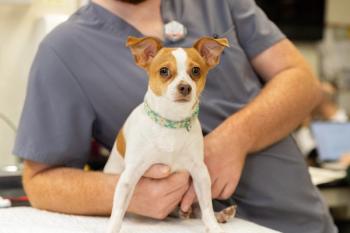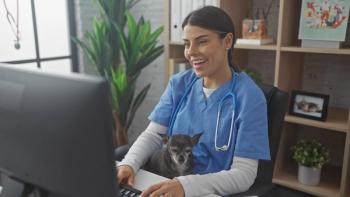
Veterinary surgeons: Have scalpel, will travel
A new crop of board-certified specialists are bringing top-notch care and convenience to veterinary practices across the country.
Veterinary medicine is becoming more specialized with every decade. In human medicine, a physician is required to know only one species, one body system or one surgical condition. In veterinary medicine, we are required to cover many body systems and conditions in our patients—which may include a variety of species.
The mixed-animal practitioner is required to know an overwhelming breadth and depth of information. Even veterinarians at a general practice limited to small animals must have a solid knowledge base in the areas of preventive medicine, internal medicine, dermatology, dentistry, nutrition, behavior, trauma and more.
Because it's impossible for veterinarians to be experts in all things, most tend to pick a few strengths to focus on and market themselves to target these niches. But clients may demand services that many general practices don't perform due to a lack of equipment or training or comfort with the potential complications of a given procedure. For example, a general practitioner might not feel comfortable dealing with a Labrador retriever with a cranial cruciate ligament tear that requires a tibial plateau leveling osteotomy, a beagle with bilateral perineal hernias or a cocker spaniel in need of a total ear canal ablation.
What are the options?
When faced with these types of challenging cases, discussions ensue with clients to educate them and weigh the possibilities for their pet's treatment. The option of introducing a board-certified surgical specialist for these advanced procedures is weighed. But pet owners may have busy work schedules or other circumstances that preclude them from driving to a board-certified surgical specialist. When a client needs a specialized surgical procedure for his or her pet, but is unwilling or unable to travel to a referral institution, what can be offered?
Depending upon one's location, it may no longer be necessary to decline treatment or call in a veterinarian with credentials that cannot be confirmed are "specialized." Now one can offer top-level care in the comfort and convenience of a general practice with a traveling, board-certified specialist.
With this option, the hospital remains involved in every aspect of the patient's care—from laboratory work and anesthesia to postoperative care and recheck exams. The pet owner is able to leave his or her four-legged friend in the hands of its long-standing care advocate. This team approach is a winning recipe for the patient's low-stress experience, the owner's familiarity with how the practice works and the hospital's continued management of the case.
Meet the specialists
Nelson Priddy II, DVM, DACVS
Priddy is based in Anchorage, Alaska, where he spends most of his time serving the small animal practices in that region. Alaska is a large state and some of the larger communities, such as Juneau and Ketchikan, are not on the road system. Other locations, such as Fairbanks and the Kenai Peninsula, are many hours away by car but only a short time by air. As such, he flies commercially to those locations.
Dr. Nelson Priddy is a frequent flyer to clinics in Alaska to perform specialized procedures. (PHOTOS COURTESY OF DR. JENNIFER WARDLAW)
Priddy supplies all of the surgical instrumentation, implants, gowns and drapes and generally brings his own technician to assist. The host hospital provides the facility, anesthesia, hospitalization, radiology and dispensable medications. This has proven to be a wonderful service for those pets that cannot be shipped to a referral center or for those pet owners who are unable or unwilling to travel.
Joe Bojrab, DVM, DACVS
Bojrab has had a mobile surgery practice in Las Vegas for the past 27 years. He was a professor and head of small animal surgery at the University of Missouri College of Veterinary Medicine for 14 years and an editor of nine textbooks on small animal surgery.
Dr. Joe Bojrab prepares to perform a total ear canal ablation for chronic otitis in a dog.
He travels with all of his equipment. For the practitioner, it's like having a board-certified surgeon on his or her staff. He can be there in minutes and talk to the client or help with a surgery in progress. He can also give host veterinarians continuing education hours for the time they assist him.
Chris Hill, VMD, DACVS-SA
Hill completed veterinary school and his residency training at the University of Pennsylvania School of Veterinary Medicine. Since 2001, Hill has run a concierge surgical practice based in Charleston, S.C., and is also a research fellow in the orthopedics department of the Medical University of South Carolina.
Dr. Chris Hill performs a cranial cruciate ligament repair in a dog.
He enjoys all aspects of orthopedic and soft tissue surgery and is always willing to help veterinarians become more comfortable with various procedures or learn new ones.
Phil Zeltzman, DVM, DACVS-SA
Zeltzman has been a traveling surgeon in eastern Pennsylvania and western New Jersey for the past five years. His practice is fairly similar to his colleagues'. He also has created SURGE, a buying group, available to surgeons nationwide.
Dr. Phil Zeltzman is not only a board-certified surgeon, but he's also the author of Walk a Hound, Lose a Pound.
"By joining forces, we all benefit from economies of scale," he explains. "The savings on disposables (e.g., drapes and gowns) and orthopedic implants are significant at the end of the year." In addition to the savings aspect, the group now has an entire network of surgeons who help each other with specific patients, allowing them to better serve their referring veterinarians.
Looking ahead
Small animal practice, and veterinary medicine in general, continues to evolve as the demands of our clients grow. The standard of care has been raised for surgical expertise, novel techniques and advanced training. As the world of specialty veterinary medicine expands, it also evolves.
Tips for success with your concierge board-certified surgeon
There are many traveling or "concierge" specialists who bring their expertise to the general practice. A board-certified radiologist can come to a practice to read radiographs or perform ultrasonography. A board-certified dental specialist can travel for root canals, and a board-certified cardiologist can travel for echocardiograms or medical consultations.
For more information on finding a traveling, board-certified surgeon in your area, visit
Dr. Jennifer Wardlaw is a board-certified small animal surgeon and founder of Gateway Veterinary Surgery (
Newsletter
From exam room tips to practice management insights, get trusted veterinary news delivered straight to your inbox—subscribe to dvm360.





